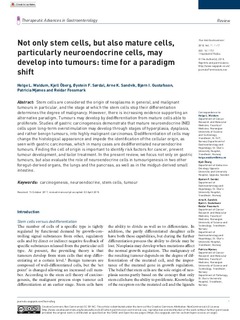Not only stem cells, but also mature cells, particularly neuroendocrine cells, may develop into tumours: time for a paradigm shift
Waldum, Helge; Öberg, Kjell; Sørdal, Øystein Finset; Sandvik, Arne Kristian; Gustafsson, Björn; Mjønes, Patricia; Fossmark, Reidar
Journal article, Peer reviewed
Published version

Åpne
Permanent lenke
http://hdl.handle.net/11250/2612096Utgivelsesdato
2018Metadata
Vis full innførselSamlinger
- Institutt for klinisk og molekylær medisin [3536]
- Publikasjoner fra CRIStin - NTNU [38127]
- St. Olavs hospital [2511]
Sammendrag
Stem cells are considered the origin of neoplasms in general, and malignant tumours in particular, and the stage at which the stem cells stop their differentiation determines the degree of malignancy. However, there is increasing evidence supporting an alternative paradigm. Tumours may develop by dedifferentiation from mature cells able to proliferate. Studies of gastric carcinogenesis demonstrate that mature neuroendocrine (NE) cells upon long-term overstimulation may develop through stages of hyperplasia, dysplasia, and rather benign tumours, into highly malignant carcinomas. Dedifferentiation of cells may change the histological appearance and impede the identification of the cellular origin, as seen with gastric carcinomas, which in many cases are dedifferentiated neuroendocrine tumours. Finding the cell of origin is important to identify risk factors for cancer, prevent tumour development, and tailor treatment. In the present review, we focus not only on gastric tumours, but also evaluate the role of neuroendocrine cells in tumourigenesis in two other foregut-derived organs, the lungs and the pancreas, as well as in the midgut-derived small intestine.
